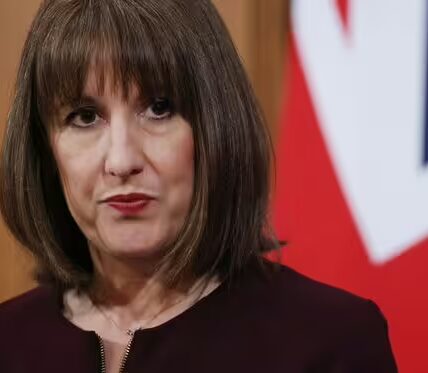Reeves must break election pledge ‘one way or another’, says think tank as it challenges claim commitment ‘referred only to workers’ taxes’

Rachel Reeves will be guilty of a “straightforward breach” of Labour’s election manifesto if she goes ahead with raising employers’ National Insurance, the leading economic think tank has warned.
Paul Johnson, director of the Institute for Fiscal Studies (IFS), said the Chancellor will “almost certainly” have to breach the manifesto if she wants to raise large amounts of money.
On Sunday, a Cabinet minister gave the strongest hint yet that an increase in employers’ NI contributions was being considered as part of the Oct 30 Budget.
Jonathan Reynolds, the Business Secretary, said the manifesto commitment not to raise NI did not include employers’ contributions but referred only to “taxes on working people”.
He said: “That pledge, it was taxes on working people, so it was specifically in the manifesto, a reference to employees and to income tax.”

On Monday morning, Mr Johnson questioned this, telling Times Radio: “Let’s see whether she does it. I mean, it seems to me that would be a straightforward breach of a manifesto commitment.
“I went back and read the manifesto and it says very clearly ‘we will not raise rates of National Insurance’. It doesn’t specify employee National Insurance.
“But set that to one side, I think if she does want to raise genuinely significant amounts of money, then she almost certainly will have to breach that manifesto one way or another.
“And it’s probably less damaging to raise National Insurance or income tax or VAT than it would be to try and get similar amounts in other ways.
“So, would this be dramatically damaging if it was another penny on National Insurance? I mean, frankly, probably not.
“They would raise significant amounts of money as well, employer National Insurance, one penny gets you something like £16 billion or £17 billion a year.
“So it’s a big chunk of money from a relatively small proportionate change in a very big tax.”
Robert Jenrick, the Tory leadership contender, has called a rise in employers’ NI contributions as a “tax on jobs”, saying it will leave companies with less money to invest.
Labour’s manifesto said: “We will ensure taxes on working people are kept as low as possible. Labour will not increase taxes on working people, which is why we will not increase National Insurance, the basic, higher, or additional rates of income tax, or VAT.”

In Prime Ministers’ Questions, Sir Keir Starmer refused on three occasions to deny that employers’ NI could go up.
The IFS director also downplayed the importance of the UK’s investment summit, held at London’s Guildhall.
Mr Johnson said a lot of the business investment being announced at the summit was “going to happen anyway” and it was unlikely to make “an enormous difference” to the economy.
“It seems to me surprising that companies would decide to do these sorts of things on the basis that they’ve been invited to a summit,” he said.
“My guess is that most of these things were going to happen anyway and they’ve decided to announce them at this point, but there may be additional things here.
“But yes, of course, the actual investment is real. Whether it’s real because of this summit or whether it would have been real anyway, I don’t know.”
‘This is all terribly important’
He added: “To the extent that this is stuff that would have happened anyway, of course, it’s absolutely vital to the economy that these things happen.
“So yes, this is all terribly important, it’s all absolutely vital for the economy.
“But is this a sort of sudden one-off surge, which is going to make an enormous difference over the next few years relative to the last few years? I think that’s less likely.
“I think this is the sort of investment that you need just to keep the economy going.”
It comes after City figures such as the chief executive of Lloyds Bank, Britain’s biggest lender, said NI would be one of the “worst taxes” to increase because it would be a “handbrake” on investment and hammer businesses by making it more expensive to hire staff.
Charlie Nunn, the chief executive of Lloyds Bank, said: “Anything that helps people continue to invest and take appropriate risk, we think, is really important. Anything that does the opposite would be a handbrake.
“Pensions, and contributions to pensions, are critical. We see about 40 per cent of people in the UK have a pension which won’t give them even a basic living allowance when they retire. So we need to increase enrolment and investments in pensions.”
Kate Nicholls, the chief executive of UK Hospitality, said: “This is a tax on jobs. An increase in NICs makes it harder to employ people and to take a risk on recruitment and expansion, because the costs of it will be so much higher.”
Lord Spencer, the billionaire investor and a Tory donor, accused Labour of breaking its promise not to tax working people.
He said: “It’s a breach of the principle of their commitment not to change income tax rates.
“They said they weren’t going to change National Insurance and they’re now redefining it and saying they weren’t referring to corporate National Insurance.”
Asked whether raising NI in any way would be a breach of Labour’s manifesto, the Prime Minister’s spokesman said: “We’ve responded to questions on this previously. Obviously, I can’t get into speculation on the Budget, and you’ve got language from the Business Secretary over the weekend.
“Ultimately, the Government uncovered a £22 billion black hole in the public finances, which will require difficult decisions to fix the foundations of the economy so that we can rebuild Britain and make every part of the country better off
“But, of course, we remain committed to the manifesto, which says we will ensure taxes on working people are kept as low as possible, which is why we will not increase National Insurance, the basic higher or additional rates of income tax, or VAT.”



